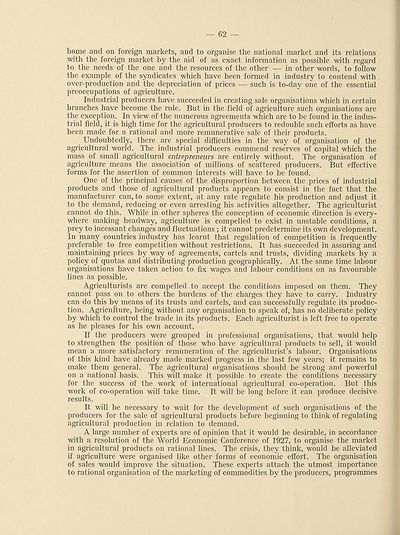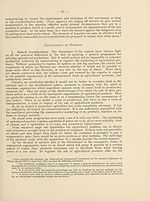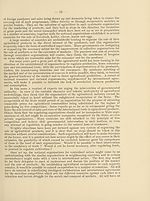Download files
Complete book:
Individual page:
Thumbnail gallery: Grid view | List view

— 62 —
home and on foreign markets, and to organise the national market and its relations
with the foreign market by the aid of as exact information as possible with regard
to the needs of the one and the resources of the other — in other words, to follow
the example of the syndicates which have been formed in industry to contend with
over-production and the depreciation of prices — such is to-day one of the essential
preoccupations of agriculture.
Industrial producers have succeeded in creating sale organisations which in certain
branches have become the rule. But in the field of agriculture such organisations are
the exception. In view of the numerous agreements which are to be found in the indus¬
trial field, it is high time for the agricultural producers to redouble such efforts as have
been made for a rational and more remunerative sale of their products.
Undoubtedly, there are special difficulties in the way of organisation of the
agricultural world. The industrial producers commend reserves of capital which the
mass of small agricultural entrepreneurs are entirely without. The organisation of
agriculture means the association of millions of scattered producers. But effective
forms for the assertion of common interests will have to be found.
One of the principal causes of the disproportion between the prices of industrial
products and those of agricultural products appears to consist in the fact that the
manufacturer can, to some extent, at any rate regulate his production and adjust it
to the demand, reducing or even arresting his activities altogether. The agriculturist
cannot do this. While in other spheres the conception of economic direction is every¬
where making headway, agriculture is compelled to exist in unstable conditions, a
prey to incessant changes and fluctuations ; it cannot predetermine its own development.
In many countries industry has learnt that regulation of competition is frequently
preferable to free competition without restrictions. It has succeeded in assuring and
maintaining prices by way of agreements, cartels and trusts, dividing markets by a
policy of quotas and distributing production geographically. At the same time labour
organisations have taken action to fix wages and labour conditions on as favourable
lines as possible.
Agriculturists are compelled to accept the conditions imposed on them. They
cannot pass on to others the burdens of the charges they have to carry. Industry
can do this by means of its trusts and cartels, and can successfully regulate its produc¬
tion. Agriculture, being without any organisation to speak of, has no deliberate policy
by which to control the trade in its products. Each agriculturist is left free to operate
as he pleases for his own account.
If the producers were grouped in professional organisations, that would help
to strengthen the position of those who have agricultural products to sell, it would
mean a more satisfactory remuneration of the agriculturist’s labour. Organisations
of this kind have already made marked progress in the last few years; it remains to
make them general. The agricultural organisations should be strong and powerful
on a national basis. This will make it possible to create the conditions necessary
for the success of the work of international agricultural co-operation. But this
work of co-operation will take time. It will be long before it can produce decisive
results.
It will be necessary to wait for the development of such organisations of the
producers for the sale of agricultural products before beginning to think of regulating
agricultural production in relation to demand.
A large number of experts are of opinion that it would be desirable, in accordance
with a resolution of the World Economic Conference of 1927, to organise the market
in agricultural products on rational lines. The crisis, they think, would be alleviated
if agriculture were organised like other forms of economic effort. The organisation
of sales would improve the situation. These experts attach the utmost importance
to rational organisation of the marketing of commodities by the producers, programmes
home and on foreign markets, and to organise the national market and its relations
with the foreign market by the aid of as exact information as possible with regard
to the needs of the one and the resources of the other — in other words, to follow
the example of the syndicates which have been formed in industry to contend with
over-production and the depreciation of prices — such is to-day one of the essential
preoccupations of agriculture.
Industrial producers have succeeded in creating sale organisations which in certain
branches have become the rule. But in the field of agriculture such organisations are
the exception. In view of the numerous agreements which are to be found in the indus¬
trial field, it is high time for the agricultural producers to redouble such efforts as have
been made for a rational and more remunerative sale of their products.
Undoubtedly, there are special difficulties in the way of organisation of the
agricultural world. The industrial producers commend reserves of capital which the
mass of small agricultural entrepreneurs are entirely without. The organisation of
agriculture means the association of millions of scattered producers. But effective
forms for the assertion of common interests will have to be found.
One of the principal causes of the disproportion between the prices of industrial
products and those of agricultural products appears to consist in the fact that the
manufacturer can, to some extent, at any rate regulate his production and adjust it
to the demand, reducing or even arresting his activities altogether. The agriculturist
cannot do this. While in other spheres the conception of economic direction is every¬
where making headway, agriculture is compelled to exist in unstable conditions, a
prey to incessant changes and fluctuations ; it cannot predetermine its own development.
In many countries industry has learnt that regulation of competition is frequently
preferable to free competition without restrictions. It has succeeded in assuring and
maintaining prices by way of agreements, cartels and trusts, dividing markets by a
policy of quotas and distributing production geographically. At the same time labour
organisations have taken action to fix wages and labour conditions on as favourable
lines as possible.
Agriculturists are compelled to accept the conditions imposed on them. They
cannot pass on to others the burdens of the charges they have to carry. Industry
can do this by means of its trusts and cartels, and can successfully regulate its produc¬
tion. Agriculture, being without any organisation to speak of, has no deliberate policy
by which to control the trade in its products. Each agriculturist is left free to operate
as he pleases for his own account.
If the producers were grouped in professional organisations, that would help
to strengthen the position of those who have agricultural products to sell, it would
mean a more satisfactory remuneration of the agriculturist’s labour. Organisations
of this kind have already made marked progress in the last few years; it remains to
make them general. The agricultural organisations should be strong and powerful
on a national basis. This will make it possible to create the conditions necessary
for the success of the work of international agricultural co-operation. But this
work of co-operation will take time. It will be long before it can produce decisive
results.
It will be necessary to wait for the development of such organisations of the
producers for the sale of agricultural products before beginning to think of regulating
agricultural production in relation to demand.
A large number of experts are of opinion that it would be desirable, in accordance
with a resolution of the World Economic Conference of 1927, to organise the market
in agricultural products on rational lines. The crisis, they think, would be alleviated
if agriculture were organised like other forms of economic effort. The organisation
of sales would improve the situation. These experts attach the utmost importance
to rational organisation of the marketing of commodities by the producers, programmes
Set display mode to:
![]() Universal Viewer |
Universal Viewer | ![]() Mirador |
Large image | Transcription
Mirador |
Large image | Transcription
Images and transcriptions on this page, including medium image downloads, may be used under the Creative Commons Attribution 4.0 International Licence unless otherwise stated. ![]()
| League of Nations > Economic and financial section > Agricultural crisis > Volume 1 > (64) |
|---|
| Permanent URL | https://digital.nls.uk/190903482 |
|---|
| Shelfmark | LN.II.2/2.(35) |
|---|---|
| Attribution and copyright: |
|
| Shelfmark | LN.II.2/2.(35-35) |
|---|---|
| Shelfmark | LN.II |
|---|
| Description | Over 1,200 documents from the non-political organs of the League of Nations that dealt with health, disarmament, economic and financial matters for the duration of the League (1919-1945). Also online are statistical bulletins, essential facts, and an overview of the League by the first Secretary General, Sir Eric Drummond. These items are part of the Official Publications collection at the National Library of Scotland. |
|---|---|
| Additional NLS resources: |
|

